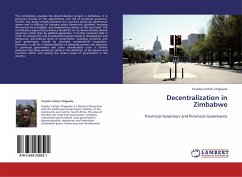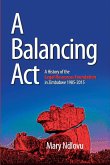This contribution analyzes the decentralization project in Zimbabwe. It in particular focuses on the appointment and role of provincial governors. Further, the study critically examines the country s provincial governance system and its efficacy for bringing about democratic pluralism, ensuring downward accountability, and empowering citizens at the local level. The contribution argues that provinces should be run by democratically elected governors rather than by political appointees. It further maintains that in order to enhance the role of subnational governments in development and democracy, sub-national levels of government, including provinces and local government, should be accorded constitutional recognition. Moreover, it calls for a decentralization of adequate powers and resources to provincial government and other decentralized units. It further maintains that there should be clarity in the definition of the powers and functions within and among the various levels of government in the country.
Bitte wählen Sie Ihr Anliegen aus.
Rechnungen
Retourenschein anfordern
Bestellstatus
Storno








